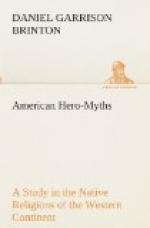[Footnote 1: The title of the Tzendal MSS., is said by Cabrera to be “Proof that I am a Chan.” The author writes in the person of Votan himself, and proves his claim that he is a Chan, “because he is a Chivim.” Chan has been translated serpent; on chivim the commentators have almost given up. Supposing that the serpent was a totem of one of the Tzendal clans, then the effort would be to show that their hero-god was of that totem; but how this is shown by his being proved a chivim is not obvious. The term ualum chivim, the land of the chivim. appears to be that applied, in the MS., to the country of the Tzendals, or a part of it. The words chi uinic would mean, “men of the shore,” and might be a local name applied to a clan on the coast. But in default of the original text we can but surmise as to the precise meaning of the writer.]
It scarcely seems necessary for me to point out that his name Votan is in no way akin to Othomi or Tarasco roots, still less to the Norse Wodan or the Indian Buddha, but is derived from a radical in pure Maya. Yet I will do so, in order, if possible, to put a stop to such visionary etymologies.
As we are informed by Bishop Nunez de la Vega, uotan in Tzendal means heart. Votan was spoken of as “the heart or soul of his people.” This derivation has been questioned, because the word for the heart in the other Maya dialects is different, and it has been suggested that this was but an example of “otosis,” where a foreign proper name was turned into a familiar common noun. But these objections do not hold good.
In regard to derivation, uotan is from the pure Maya root-word tan, which means primarily “the breast,” or that which is in front or in the middle of the body; with the possessive prefix it becomes utan. In Tzendal this word means both breast and heart. This is well illustrated by an ancient manuscript, dating from 1707, in my possession. It is a guide to priests for administering the sacraments in Spanish and Tzendal. I quote the passage in point[1]:—
[Footnote 1: Modo de Administrar los Sacramentos en Castellano y Tzendal, 1707. 4to MS., p. 13.]
“Con todo tu corazon, hiriendote en los pechos, di, conmigo.”
Ta zpizil auotan, xatigh zny auotan, zghoyoc, alagh ghoyoc.—
Here, a is the possessive of the second person, and uotan is used both for heart and breast. Thus the derivation of the word from the Maya radical is clear.
The figure of speech by which the chief divinity is called “the heart of the earth,” “the heart of the sky,” is common in these dialects, and occurs repeatedly in the Popol Vuh, the sacred legend of the Kiches of Guatemala.[2]
[Footnote 2: Thus we have (Popol Vuh, Part i, p. 2) u qux cho, Heart of the Lakes, and u qux palo, Heart of the Ocean, as names of the highest divinity; later, we find u qux cah, Heart of the Sky (p. 8), u qux uleu, Heart of the Earth, p. 12, 14, etc.




